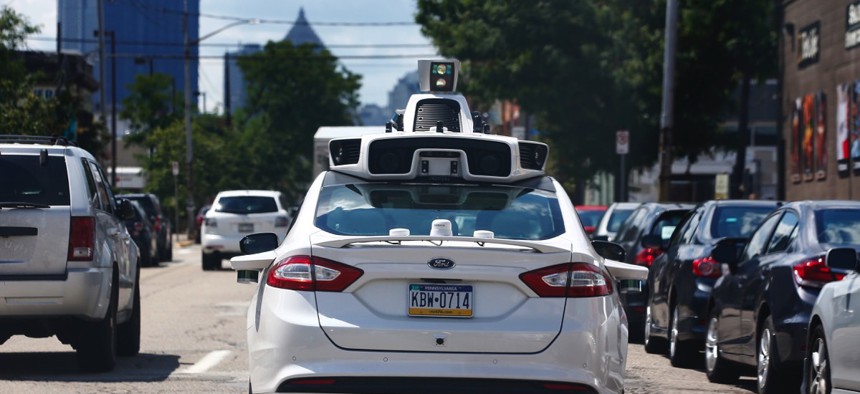San José Looks to Integrate Autonomous Vehicles Into Its Transportation Strategy

One of Uber's autonomous vehicles navigates Pittsburgh's roads. Jared Wickerham / Route Fifty
Trump’s decision to pull the U.S. from the Paris climate agreement will likely speed up the push to embrace self-driving cars in the sustainability-minded and tech-oriented California city.
The city of San José issued a call for small autonomous vehicle pilots Thursday to private sector companies looking to help the city reduce carbon emissions, traffic fatalities and injuries within its multimodal transportation network.
By 2040, San José, which currently has a population of just more than 1 million residents, is expected to grow 40 percent, so it’s looking to tap into Silicon Valley’s growing AV industry with its new request for information.
Intel opened an Autonomous Driving Garage in the city in early May, San José being home to a sizeable AI tech hub.
“Autonomous vehicles have enormous potential to help cities improve traffic safety, relieve congestion, and improve transportation mobility for seniors, people with disabilities and other disadvantaged groups,” Mayor Sam Liccardo said in a statement. “Through this initiative, and our broader Smart City Vision, we’ll explore pilot projects that will provide us a deep, data-driven look at how autonomous vehicles might serve as a solution to our city’s transportation needs and improve our residents’ quality of life.”
More than a dozen traditional automakers and tech companies testing the AV waters have expressed initial interest in the city’s plans during roundtable discussions, among them Lyft, Ford and GM.
Other goals of San José’s AV pilots are creating a more equitable transit network, boosting livability and walkability, and increasing data-based transportation decisions.
Specific projects the city is entertaining are: linking Diridon Station and the airport, reducing traffic in the Stevens Creek-San Carlos Corridor, integrating AVs on downtown streets, adding them to the jobs-heavy North San José Transportation Innovation Zone, and connecting the Homeless Veterans Emergency Housing Facility with the VTA light-rail system’s Capitol Station.
Ease of implementation, use of data and scalability are chief in the city’s mind when selecting pilots. Pilot partners receive a city contact and access to infrastructure and data.
Potential partners have until late July to respond to the RFI.
President Trump’s withdrawal of the U.S. from the Paris Accords, a non-binding agreement to help curb climate change by reducing carbon emissions among other steps, will likely encourage cities committed to sustainability like San José to take a hard look at AVs—if they weren’t already.
“Today's decision to withdraw from the Paris Accords represents a disappointing, but not surprising setback in the fight against climate change,” Liccardo said in a statement. “While politicians in Washington continue to languish in a petroleum-fueled past, cities like San Jose will chart the path to a more sustainable future…”
Dave Nyczepir is a News Editor at Government Executive’s Route Fifty and is based in Washington, D.C.
NEXT STORY: White House pushes for drone deterrence authority






